Editor:
Brandon Sweet
University Communications
bulletin@uwaterloo.ca
Inspiring leaders will receive honorary degrees next week
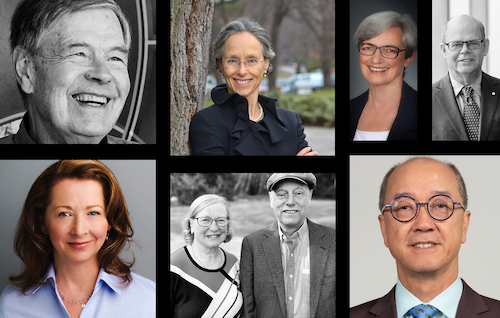
By Kathy Smidt.
Convocation is a time for celebration, reflection, and inspiration. It’s a time to acknowledge the hard work and dedication of students and to celebrate accomplishments. It’s a time to reflect on unforgettable moments that shaped growth and direction throughout university life. And it’s a time to be inspired to action, to make a positive impact beyond the campus of the University of Waterloo.
We’re proud of Waterloo talent — our students, professors, and alumni who are making a difference around the world. And we also want to recognize those thought leaders and influencers who are advancing society across a spectrum of disciplines. These are leaders our graduates can look to for inspiration as they prepare themselves for the future.
“Every year, we confer honorary degrees on incredible individuals who have accomplished great things,” says Vivek Goel, president and vice-chancellor of the University of Waterloo. “We know our graduates will take inspiration from these individuals as they set out on their own paths of discovery.”
This year, Waterloo will be recognizing 18 outstanding individuals with honorary degrees and distinctions. Congratulations to all recipients. Here’s a little about a few of them:
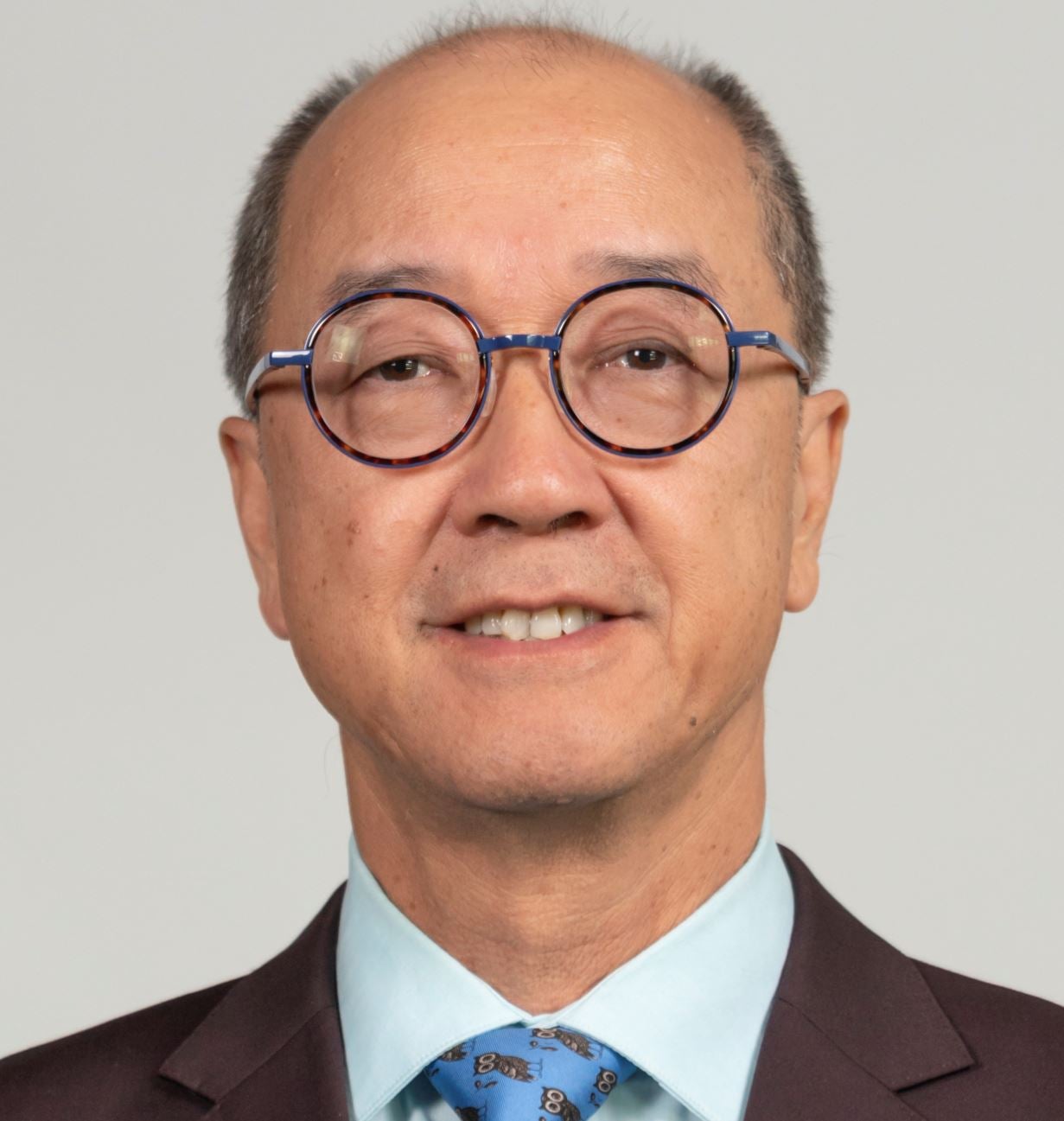
Tony Chan is an esteemed mathematician and thought leader in computational models and algorithms for image processing. His academic and professional achievements include a PhD in Computer Science from Stanford University; a Research Fellowship at Caltech; an honorary doctorate from the University of Strathclyde; several fellowships on engineering, math, and science associations; a 2020 SIAM Prize for Distinguished Service to the Profession; he was the president of the Hong Kong University of Science and Technology, and is currently the president of the King Abdullah University of Science and Technology.
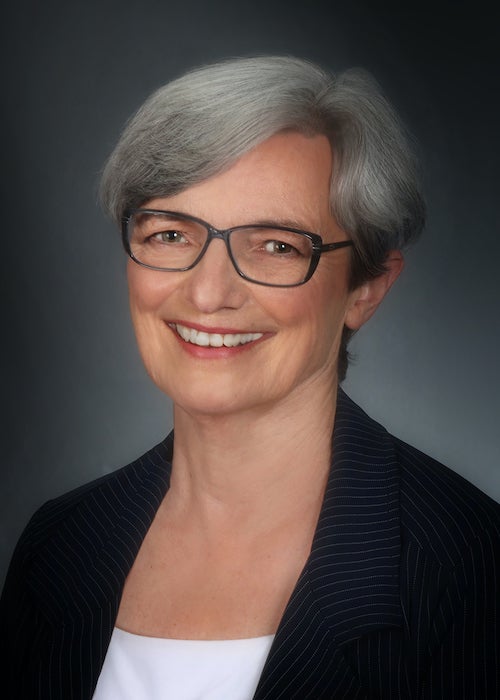
As a faculty member of the University of Guelph’s School of Engineering, Valerie Davidson developed ground-breaking engineering models for complex food processing systems to improve quality and safety. During this time, she created innovative courses in bioprocess and food engineering which earned her the Provost’s Award for Innovation in teaching. Davidson consulted for the United Nations Food and Agriculture Organization, is a recipient of the Ontario Professional Engineers’ Award for Citizenship, and is a champion of diversity in her profession, serving as NSERC Chair for Women in Science and Engineering, and is the founder of the Ontario Network of Women in Engineering.
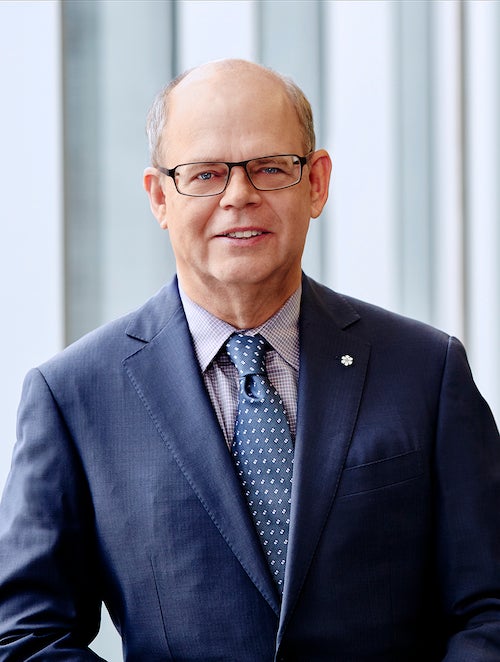
Douglas Fregin has been spearheading technical innovations for more than 35 years. Co-founding Research In Motion (RIM) in 1984 and Quantum Valley Investments in 2013, he has been instrumental in advancing how we live and work every day. From launching the first smartphone to putting the Region of Waterloo at the forefront of the quantum technologies industry, to accelerating study and research in nanotechnology by donating millions to University of Waterloo, his contributions continue to push the boundaries of technology. Fregin was appointed to the Order of Canada and has received several awards, including a Technical Emmy Award with Kodak and the National Film Board of Canada, and the Queen Elizabeth II Diamond Jubilee Medal.
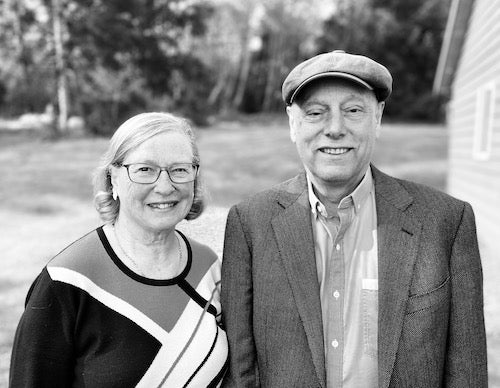
Doctors Ann and John Heath received their medical degrees at McGill University and completed postgraduate medical training in Halifax, Winnipeg, and Vancouver. They established a practice in Campbell River B.C. and conducted many clinical research studies there. In 1985, they founded Yellow Island Aquaculture on Quadra Island B.C., which is a centre for aquaculture research that has made incredible contributions to science. Their research has been recognized with a NSERC Synergy Award and publications include contributions to Nature and Science magazines.
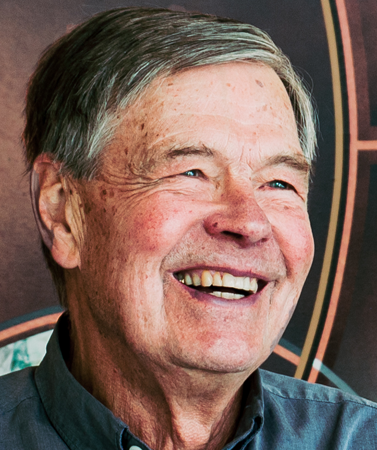
Acclaimed for his work in macro-economic modelling, energy economics and policy, and global trade flows, John Helliwell has received honours that include Fellow of the Royal Society of Canada, Distinguished Fellow of the Canadian Institute for Advanced Research, and Officer of the Order of Canada. His contributions to the annual World Happiness Report, a United Nations publication that ranks countries according to national well-being, have been influential in creating government policies that strive toward sustainable development and look beyond the gross national product and per capita income.
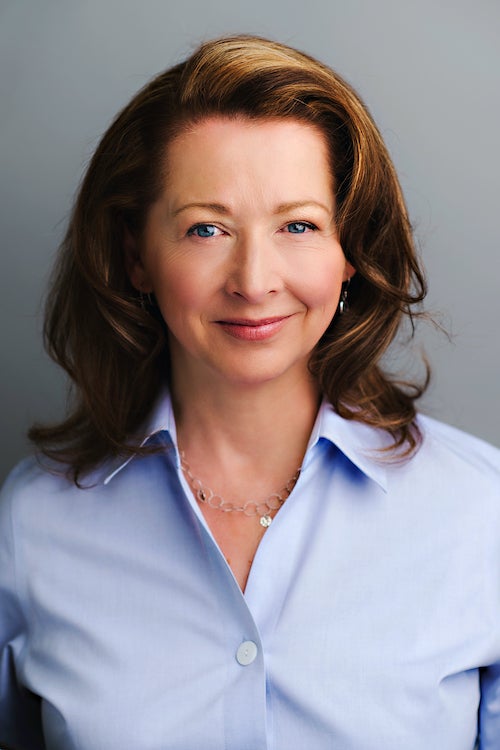
Carol Leaman is an entrepreneur, thought leader, and disruptor in the corporate learning space. She has been the CEO of successful businesses such as PostRank Inc., RSS Solutions, and Fakespace Systems, and has overseen the acquisitions of numerous companies. In 2013, she received the prestigious designation of Fellow of Chartered Professional Accountants (FCPA) and is currently the CEO of Axonify. Leaman continues to contribute to the high-tech industry by serving as an advisor on several boards, and her articles appear in many leading learning, business and technology publications. Leaman is also the recipient of the Sarah Kirke Award, the Waterloo Region Entrepreneur Hall of Fame Intrepid Award, and the Profit500 Award for Canada’s Leading Female Entrepreneur.
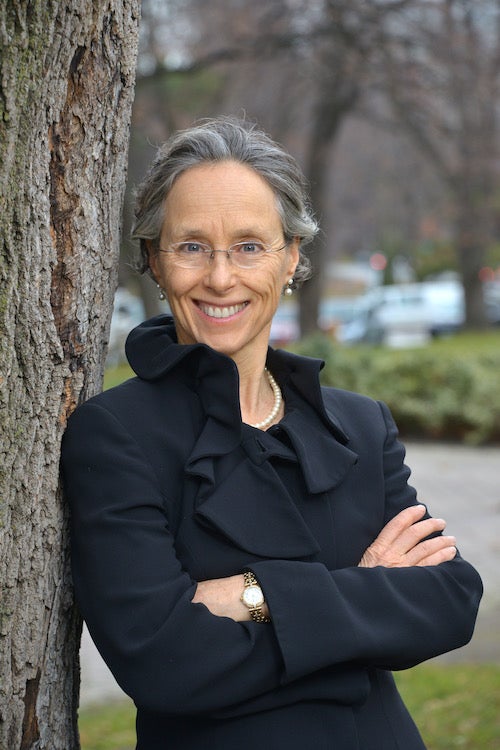
For more than 45 years, Dianne Saxe has been one of Canada’s leading environmental lawyers. She’s also an influential author, committed to keeping the public informed of their environmental rights and duties, and the importance of addressing climate challenges. Saxe served as the Environmental Commissioner of Ontario, where she provided extensive analysis of the government’s commitments to protecting the environment and engaged people in conversations about Ontario’s sustainable future.
Degrees and diplomas will be conferred across a total of 14 ceremonies in June 2022. For more information visit the Convocation website.
CIHR Commercialization Peer Review Committee information session coming up
A message from the Office of Research.
You are invited to a CIHR Commercialization Peer Review Committee Information Session on Thursday June 23, 2022, from 12:00 noon to 1:30 p.m. The purpose of this session is to give potential applicants to the Commercialization Peer Review Committee of the CIHR Project Grant program (CMZ) an opportunity to hear first-hand about the committee ‘culture’: what aspects are generally well-received by reviewers in CMZ, what factors are considered more important than others, how the committee’s mandate is interpreted, and what types of proposals are transferred to or from other committees. Dr. Kathleen Marsman from Borden Ladner Gervais LLP is the current Chair of CMZ and will be available to make comments on these issues and to interact with potential applicants concerning their questions.
About the speaker
Kathleen Marsman, PhD, is a registered Canadian and U.S. Patent Agent and a Senior Associate at Borden Ladner Gervais LLP. A Waterloo alum (Biochemistry ‘88), she specializes in patent applications for the life sciences, biotechnology, nutrition and chemistry sectors. She counsels patent applicants on matters of patentability, filing strategy and portfolio management. Her clients include universities, healthcare institutions, start-ups and multinational pharmaceutical and consumer product companies. Learn more about her expertise at https://www.blg.com/en/people/m/marsman-kathleen
Registration
Please register here by June 17. As part of the registration process, you will be asked to pre-submit questions for the speaker. For further information, please contact Carly Turnbull, Manager, Centre for Bioengineering and Biotechnology.
This event is open to University of Waterloo faculty and staff. Ideally suited for faculty members in the areas of health and commercialization, especially those involved in startups, with close ties to companies, or with commercialization ambitions. Participants are encouraged to review the CIHR commercialization criteria beforehand at https://cihr-irsc.gc.ca/e/50439.html.
Opportunities to provide input on Teaching and Learning projects
A message from the Office of the Associate Vice-President, Academic.
A number of teaching and learning initiatives are underway on campus, and they will be seeking input from instructors, students, staff, and academic leadership. The timelines for consultation on the various initiatives are listed below, followed by additional information about each project. Further communication participating in these consultations will be coming from various working groups over the next few months.
| Project | Origin | Instructors | Students | Staff | Leadership |
|---|---|---|---|---|---|
| Teaching Assessment Processes | AVPA | Ongoing | n/a | n/a | Ongoing |
|
Digital Learning Strategy |
Provost |
June |
June |
June |
June |
|
LEARN Review |
IST-ITMS |
Fall |
Fall |
Jun-Aug |
Fall |
|
Teaching Innovation Incubator |
AVPA |
Fall |
Fall |
Fall |
Fall |
|
Credentials Framework |
AVPA, Registrar |
Fall |
TBD |
TBD |
TBD |
| Evolving the EdTech Ecosystem | IST-ITMS | ad hoc | ad hoc | ad hoc | ad hoc |
Read the rest of the article on the Associate Vice-President, Academic's website.
Q and A with Terrance Chen, inaugural recipient of $10,000 Mobility Bursary
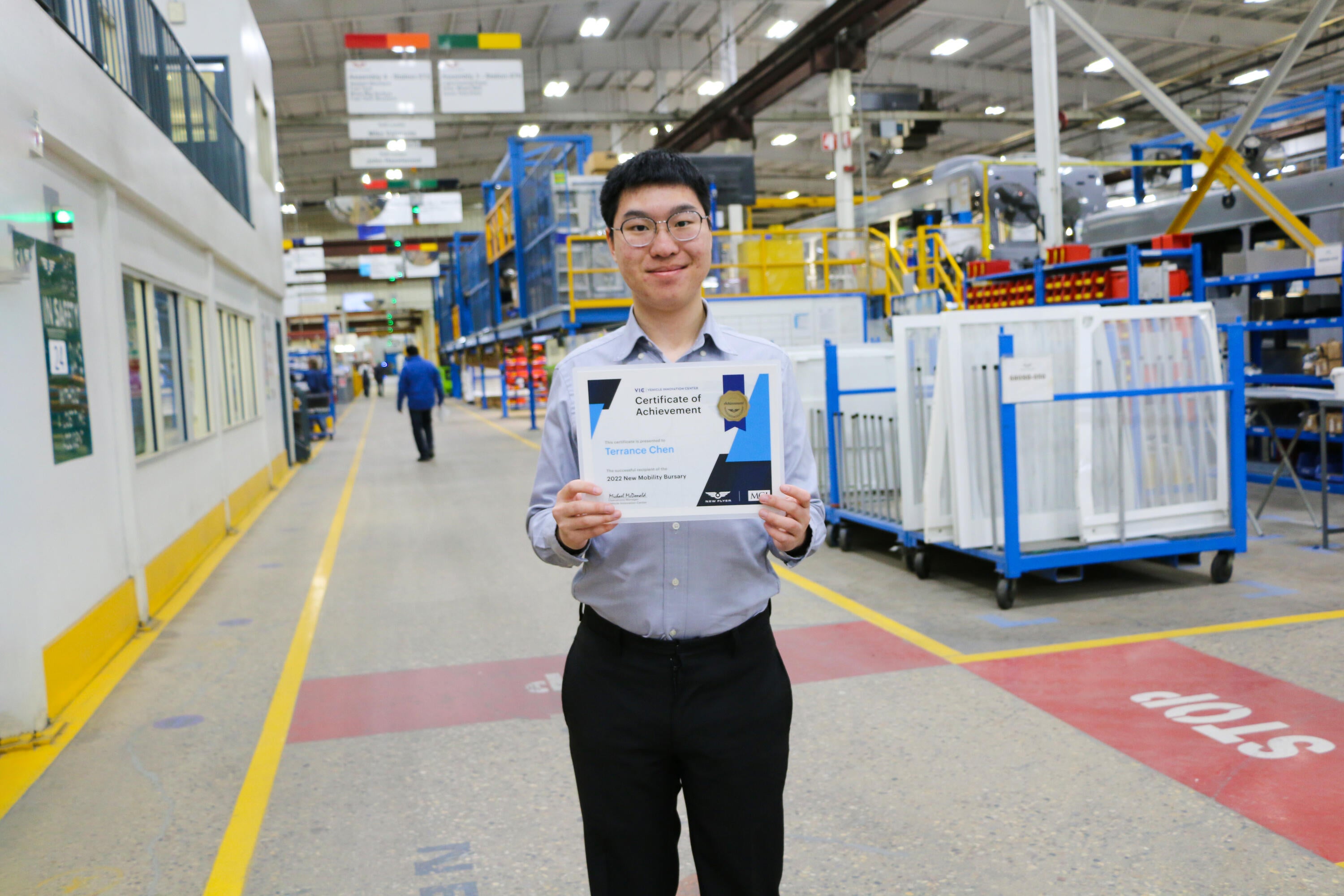
This article was originally published on Waterloo News.
A student of the School of Environment, Enterprise and Development (SEED), Terrance Chen, was announced as the inaugural recipient of the $10,000 new Mobility Bursary created by subsidiary New Flyer of America Inc. (“New Flyer”) in partnership with supplier AROW Global Corp (“AROW Global”).
First announced in November 2021 and conferred through NFI Group Inc. Vehicle Innovation Center, a leading independent bus and coach manufacturer and a leader in electric mass mobility solutions, the award is focused on supporting underserved, underrepresented, or disadvantaged individuals that are enrolled in science, technology, engineering, and math (“STEM”) related programs and intending to pursue careers in the new mobility era.
Terrance Chen, a student of Environment and Business Program discusses the process of winning the bursary, how Waterloo has influenced his thinking, and his future plans.
Can you tell us about your journey to winning this award?
I found out about this scholarship through my former supervisor in CanU were I volunteered. To apply for the scholarship, you have to write an essay about what you think the future of transportation should look like. This scholarship is offered by a bus manufacturing company, New Flyer, based in Winnipeg where I lived before attending University of Waterloo. Ironically, Winnipeg has an objectively bad public transport system for a city of its size. New Flyer exports most of it’s products. Therefore, in my essay, I used Winnipeg as an example of where change should be made. I did lots of research. In my essay, I wrote about routes for a potential subway system. I talked about how good cycling and walking infrastructure not only has environmental benefits, but also social benefits such as improving physical and mental well-being for residents. I even mentioned how having such infrastructure helps existing small businesses to thrive, and encourages more new businesses to open.
How do you feel about the win?
This bursary motivates me to do well in university and pursue a career in which I can improve infrastructure, such as urban planning or entrepreneurship in improving transportation technologies. I am passionate about technologies that lead to a more sustainable future, like the public transit systems using alternative sources of energy.
In high school, caring about things such as transportation methods and whatnot was seen as “weird” or nerdy. Now that I have won the scholarship, it gives me confidence that caring about urban planning is definitely something that people do appreciate. In fact, in my residence building (Claudette Millar Hall), I overheard a group having a conversation about public transportation and I joined them. They really appreciated me sharing my thoughts and ideas. I now think that it’s cool to care about future of transportation.
How has your time at Waterloo influenced your views on transportation?
While transportation is mostly urban planning related, and I’m not in an urban planning degree, my degree has affected my views on transportation nonetheless. The courses I have taken in my undergrad degree in Environment and Business have changed how I think of sustainability. I was taught to question how things can be improved rather than to think that it’s good to be content with “the way it’s always been”. Unfortunately, I have realised that in our current society, sustainability is not valued enough. The current North American society unfortunately is almost completely designed to only benefit the automobile industry and oil industry, at the cost of the environment and everyone’s quality of life.
In addition, living here in Waterloo region has influenced what I think is good urban planning. In Winnipeg, I have never experienced good public transit. I used to think that good public transit could not be achieved in any Canadian cities since they’re mostly low density. However, despite being similar density to Winnipeg, Waterloo has a much better public transit system. What I liked the most so far on campus is the ION train. Another incident which influenced what I thought about urban planning was that the Uber I took from Toronto to Waterloo almost had an accident on the 401 highway, which reminds me of how dangerous cars are compared to other alternative public transit.
What is your next plan?
I want to explore more opportunities since it was expansion of my interests through volunteering that led to finding out about opportunities such as this scholarship. In university, we sometimes feel that grades should be the only thing to care about. While good grades did contribute to me winning that scholarship, it is important to do extracurriculars, and especially those that benefit sustainability efforts.
I will join more clubs that are related to sustainability. I already joined Fossil Free UW last year. In my spare time, I will read and watch more about urban planning. I watch Youtube channels about urban planning and what effective public transportation looks like.
I will apply for co-ops that involve governments or companies designing better transportation methods. That includes public transit, cycling, and cars running on alternative energy. Potential careers include not just urban planning, but also doing marketing and research for better public transportation methods.
Wednesday's notes
"Everyone is invited to the Area Reps meeting this week to hear an overview of the workforce planning process being undertaken at UWaterloo," says a note from the University of Waterloo Staff Assocation (UWSA). "Guest speaker Lisa Yuhasz, Manager, Workforce Planning will speak about the framework created to help support leaders in making decisions about how UWaterloo will adapt to changing workforce needs post pandemic, which includes design and system thinking, scenario planning, employee engagement and the overall process approval."
The Area Reps meeting is being held Thursday, June 9 at 12 noon on Microsoft Teams.
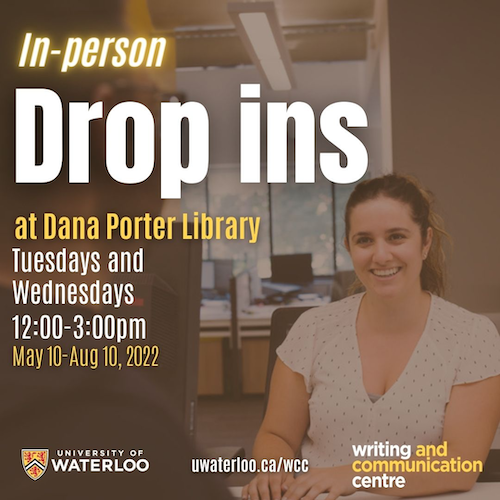
"Feeling stuck on that assignment?" asks the Writing and Communication Centre. "Our peer tutors can help. Visit us for in-person drop-in appointmentsat Dana Porter Library on Tuesdays and Wednesdays from 12:00 noon to 3:00 p.m."
Employers hosting Virtual Employer Information Sessions (VEIS) next week include Laurentian Bank Securities. Make sure to register through WaterlooWorks and check the calendar for any updates.
Link of the day
World Brain Tumour Awareness Day
When and Where to get support
Students can visit the Student Success Office online for supports including academic development, international student resources, immigration consulting, leadership development, exchange and study abroad, and opportunities to get involved.
Instructors looking for targeted support for developing online components for blended learning courses, transitioning remote to fully online courses, revising current online courses, and more please visit Agile Development | Centre for Extended Learning | University of Waterloo (uwaterloo.ca).
Instructors can visit the Keep Learning website to get support on adapting their teaching and learning plans for an online environment.
Course templates are available within your course in LEARN to help you build and edit your content and assignment pages quickly.
The following workshops, webinars, and events are offered by the KL team (CTE, CEL, ITMS, LIB):
-
Scholarship of Teaching and Learning (SoTL) Methods – self-directed, continuous self-enrollment course in LEARN.
-
Independent Blended Course Design (iBlend) - self-directed, continuous self-enrollment course in LEARN.
-
Copyright Overview for Waterloo Instructors and Staff - self-directed, continuous self-enrollment course in LEARN.
-
Independent Remote Course Design Essentials (iReCoDE)- self-directed, continuous self-enrollment course in LEARN.
-
Supporting Student Mental Health (for Instructors) – self-directed, continuous self-enrollment course in LEARN.
-
SoTL Stories, June 15, 1:00 p.m. to 2:00 p.m.
Supports are available for employees returning to campus. Visit IST’s Hybrid Work and Technology guidelines and workplace protocols to assist with the transition.
The Writing and Communication Centre has virtual services and programs to help undergrads, grad students, postdocs and faculty members with academic writing.
- Meet with writing advisors in one-to-one appointments to brainstorm, draft, revise, and polish. No time for an appointment? Try email tutoring for undergrads.
- Beat isolation and make writing progress at weekly Virtual Writing Cafés for grad students and faculty or PJ-Friendly Writing Groups for Undergrads.
- Take an online workshop or apply to our popular Dissertation Boot Camp program.
- Faculty can request custom in-class workshops for their courses, or the WCC can facilitate any existing workshops for student groups.
- Course-integrated support available. Attention faculty and instructors: The application form for Writing and Communication Centre course-integrated support is now available online. We offer five unique support streams for your courses including synchronous and asynchronous workshops and monitored discussion boards.
Co-op students can get help finding a job and find supports to successfully work remotely, develop new skills, access wellness and career information, and contact a co-op or career advisor.
The Centre for Career Action (CCA) has services and programs to support undergrads, grad students, postdocs, alumni, and employees in figuring out what they value, what they’re good at, and how to access meaningful work, co-op, volunteer, or graduate/professional school opportunities. Questions about CCA's services? Live chat, call 519-888-4047, or stop by our front desk in the Tatham Centre 8:30 a.m. to 4:30 p.m., Monday to Friday.
Drop-in to Warrior Virtual Study Halls on Wednesdays from 5:30 p.m. to 7:00 p.m. Come together in this virtual space to set goals and work independently or in groups each week.
Renison's English Language Institute continues to offer virtual events and workshops to help students practice their English language skills.
If you feel overwhelmed or anxious and need to talk to somebody, please contact the University’s Campus Wellness services, either Health Services or Counselling Services. You can also contact the University's Centre for Mental Health Research and Treatment. Good2Talk is a post-secondary student helpline available to all students.
The Library is open with expanded hours for access to book stacks, drop-in individual study space, bookable group study rooms, drop-in access to computers and printers, book pick-up services and IST Help Desk support. Librarian consultations, Special Collections & Archives and the Geospatial Centre are available by appointment. Full details on current services and hours are available on the Library’s COVID-19 Update webpage.
The Faculty Association of the University of Waterloo (FAUW) continues to advocate for its members. Check out the FAUW blog for more information.
The University of Waterloo Staff Association (UWSA) continues to advocate for its members. Check out the UWSA blog for more information.
The Sexual Violence Prevention and Response Office (SVPRO) supports all members of the University of Waterloo campus community who have experienced, or been impacted, by sexual violence. This includes all students, staff, faculty and visitors on the main campus, the satellite campuses, and at the affiliated and federated Waterloo Institutes and Colleges. For support, email: svpro@uwaterloo.ca or visit the SVPRO website.
The Office of Indigenous Relations is a central hub that provides guidance, support, and resources to all Indigenous and non-Indigenous campus community members and oversees the University's Indigenization strategy.
The Waterloo Indigenous Student Centre, based at St. Paul’s University College, provides support and resources for Indigenous students, and educational outreach programs for the broader community, including lectures, and events.
WUSA supports for students:
Peer support - MATES, Glow Centre, RAISE, Women’s Centre - Visit https://wusa.ca/services/wusa-peer-support to book an appointment either in person or online for the Fall term.
Food Support Service food hampers are currently available from the Turnkey Desk 24/7 in the Student Life Centre. Drop off locations are also open again in SLC, DC, DP, SCH and all residences.
Co-op Connection all available online. Check https://wusa.ca for more details.
Centre for Academic Policy Support - CAPS is here to assist Waterloo undergraduates throughout their experience in navigating academic policy in the instances of filing petitions, grievances and appeals. Please contact them at caps@wusa.ca. More information is available.
WUSA Student Legal Protection Program - Seeking legal counsel can be intimidating, especially if it’s your first time facing a legal issue. The legal assistance helpline provides quick access to legal advice in any area of law, including criminal. Just call 1-833-202-4571.
Empower Me is a confidential mental health and wellness service that connects students with qualified counsellors 24/7. They can be reached at 1-833-628-5589.
GSA-UW supports for graduate students:
The Graduate Student Association (GSA-UW) supports students’ academic and social experience and promotes their well-being.
Advising and Support - The GSA advises graduate students experiencing challenges and can help with navigating university policies & filing a grievance, appeal, or petition.
Mental Health covered by the Health Plan - The GSA Health Plan now has an 80 per cent coverage rate (up to $800/year) for Mental Health Practitioners. Your plan includes coverage for psychologists, registered social workers, psychotherapists, and clinical counselors.
Dental Care - The GSA Dental Plan covers 60 to 70 per cent of your dental costs and by visiting dental professionals who are members of the Studentcare Networks, you can receive an additional 20 to 30 per cent coverage.
Student Legal Protection Program - Your GSA fees give you access to unlimited legal advice, accessible via a toll-free helpline: +1-833-202-4571. This advice covers topics including housing disputes, employment disputes, and disputes with an academic institution.
The Graduate House: Open Monday to Tuesday 11:30 a.m. to 7:00 p.m. and Wednesday to Friday 11:30 a.m. to 9:00 p.m. We’re open to all students, faculty, staff, and community members. The Graduate House is a community space run by the GSA-UW. We’re adding new items to the menu. Graduate students who paid their fees can get discounts and free coffee.
When and Where (but mostly when)
Warriors vs. Laurier Blood Donation Battle. Join our “Waterloo Warriors” team on the Blood.ca website or app. #ItsInYouToGive
TD Walter Bean Visiting Professorship: faculty & graduate student meetings, Monday, June 6 to Friday, June 10.
“Moving Forward by Slowing Down: Considering Diverse Perspectives on Drug Decriminalization and Legalization,” in person or online for the Waterloo community (online for the general public), Tuesday, June 7, 1:00 p.m. to 3:30 p.m. Keynote: Dr. João Goulão, Ministry of Health, Portugal. Followed by a panel moderated by Globe and Mail journalist André Picard.
Board of Governors meeting, Tuesday, June 7, 1:30 p.m., Microsoft Teams.
Master of Taxation Virtual Information Session, Wednesday, June 8, 4:00 p.m.
CPI Talk: Digital Disinformation and Democracy, Wednesday, June 8, 6:30 p.m., Zoom.
Building Respectful Research Relationships with Indigenous Communities Webinar, Indigenous History Month 2022, Thursday, June 9, 12:00 p.m.
Brubacher House Artist-in-Residence Workshops, "June Art Classes with Yulia Balobanova," Saturday, June 11, 3:30 p.m., BRH (Brubacher House, North Campus), for kids ages 6-10.
UW Staff Board Foundations workshop via MS Teams Session 003, Tuesday, June 14 from 11:30 a.m. to 1:30 p.m., Session 003 registration link.
Positions available
On this week's list from the human resources department, viewable on the UWaterloo Talent Acquisition System (iCIMS):
- Job ID# 2022-8311 - Patrol Officer - Special Constable Service, USG 7
- Job ID# 2022-8483 - Controls Lab Technician - Mechanical and Mechatronics Engineering, USG 8 – 9
- Job ID# 2022-8586 - Associate Director, International Relations - Waterloo International, USG 13
- Job ID# 2022-8427 - Events and Special Projects Officer – Advancement, USG 9
Secondments/Internal temporary opportunities
- Job ID# 2022-8624 - Scrum Master & Project Manager - Campus Housing, USG 8
- Job ID# 2022-8023 - Associate Director, Advancement - Optometry and Vision Science, USG 12 – 13
- Job ID# 2022-8502 - Recruitment/Administrative Assistant - Centre for Ocular Research & Education, USG 4
- Job ID# 2022-8408 - Associate Director, Library, Equity, Diversity, Inclusion and Access – Library, USG 12
- Job ID# 2022-8559 - Records Coordinator - Registrar's Office, USG 5
- Job ID# 2022-8553 - Content and Digital Specialist - Institute for Quantum Computing, USG 9
Affiliated and Federated Institutions of Waterloo opportunities